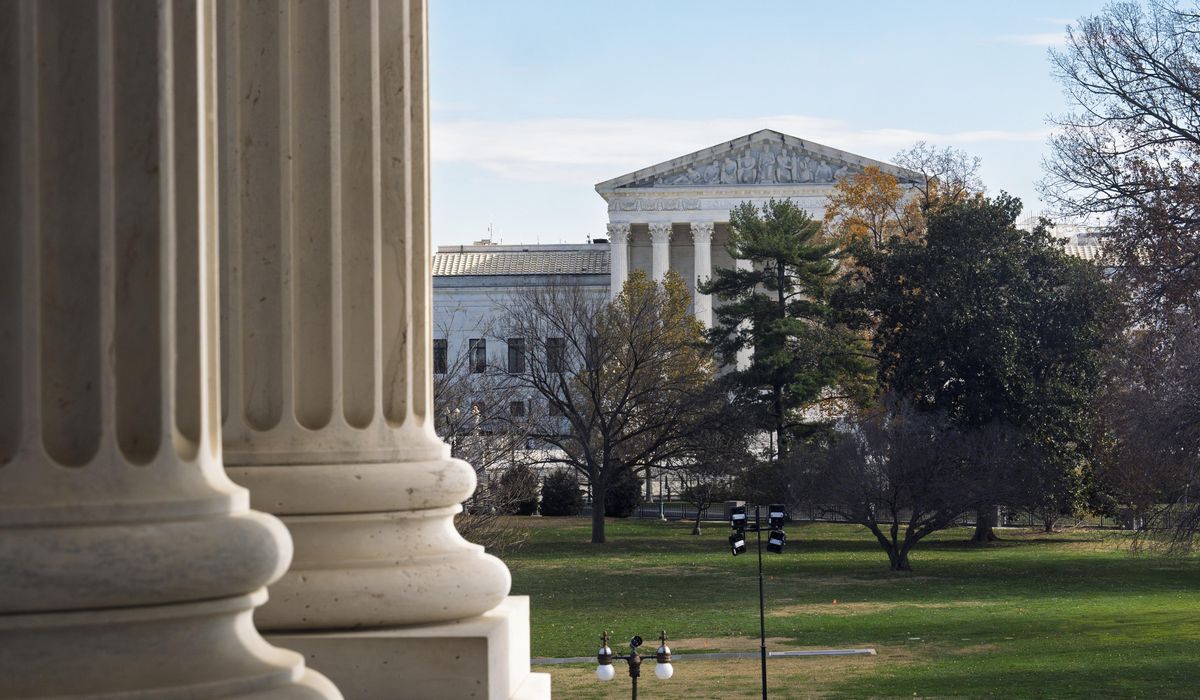


The Supreme Court grappled Wednesday with whether a state ban on medical treatment for transgender youth is discriminatory on the basis of sex, in violation of the Constitution, or if it’s rooted in protecting minors’ health and well-being.
The specific issue the justices are deciding is if Tennessee’s law, known as S.B. 1, which was enacted in 2023 and bans puberty blockers and hormone therapy for transgender minors, violates the Equal Protection Clause, which requires the government to treat all people equally.
The Biden administration and the American Civil Liberties Union challenged the ban, arguing Tennessee’s restriction treats men and women differently because a boy who wants testosterone can get it, but a girl who wants it can’t.
“This case is about access to medications,” said U.S. Solicitor General Elizabeth Prelogar.
“S.B. 1 has taken away the only treatment that has helped years of suffering,” said Chase Strangio, counsel for the ACLU, who made history as the first transgender lawyer to argue before the justices.
The conservative wing of the court focused more on the age restriction aspect of the state’s law and pushed back on claims that the discrimination was based solely on sex.
Justice Clarence Thomas, a George H.W. Bush appointee, said the law is not an outright ban, as the challengers argued.
“It is merely for minors, so why is this not the case of age verification,” he asked.
Meanwhile, Justice Brett M. Kavanaugh, a Trump appointee, said other countries have noted the harms to minors who received gender-transitioning drugs and suggested that should be a “pretty heavy yellow light” for the court.
“It doesn’t say only boys can do or only girls can do so,” he said of Tennessee’s law. “Why isn’t it best to leave it to the democratic process?”
It was the first major trans-rights case that the justices have agreed to hear since 2020, when they decided a civil rights case in favor of LGBTQ challengers, granting them protection from workplace discrimination.
Justice Neil M. Gorsuch, the Trump appointee who authored that 2020 ruling, asked no questions during Wednesday’s arguments.
The liberal wing of the court, though, stressed that the law was intended to force minors to appreciate their birth sex.
“Some children suffer incredibly,” said Justice Sonia Sotomayor, an Obama appointee. “Some attempt suicide.”
Justice Elena Kagan, another Obama appointee, questioned whether the justices should create a protected class for transgender individuals.
“What’s really going on here is a discrimination against transgender status,” she said.
Three transgender minors, their parents and a doctor who treats transgender youths challenged Tennessee’s law.
Represented by the ACLU, they argue the children received puberty-delaying medicine and hormone treatment that have allowed them to become happy and healthy. The Biden Justice Department sided with the ACLU.
It’s not clear how the incoming Trump administration, which takes office in January, may change the Justice Department’s position in the dispute. Although the justices heard arguments in the case Wednesday, a decision is not expected for months.
Roughly 22 states have moved to pass laws similar to Tennessee.
Courts have rejected restrictions similar to Tennessee’s in states such as Alabama, Arkansas, Florida, Georgia, Idaho, Indiana and Kentucky, according to the ACLU.
But the 6th U.S. Circuit Court of Appeals let Tennessee’s ban take effect.
Tennessee officials say the state Legislature heard from people who have detransitioned and did research before passing the state ban.
J. Matthew Rice, Tennessee’s solicitor general, said the ban does not run afoul of the Equal Protection Clause of the 14th Amendment because it does not classify boys and girls differently.
“It becomes a pure exercise of weighing benefits to risks,” he told the court. “All that matters is the medical purpose.”
Critics of the medical treatment for youth suffering from gender dysphoria have said it can cause infertility, among other health problems for children.
One percent of Americans are transgender, according to the Justice Department filing.
The debate on transgender care is worldwide. European nations have adopted a more conservative approach but not outright bans. The justices raised concerns with seeing other countries roll back access for minors to gender-transitioning surgeries and medicines.
Justice Kavanaugh suggested maybe that meant states should be “pumping the brakes on this kind of treatment.”
He also quizzed lawyers over whether a ruling against Tennessee would open the door for transgender athletes to compete in women’s sports.
Both Ms. Prelogar and Mr. Strangio said that sports disputes involve other state interests not at play with the medical treatment issue, which would have to be weighed.
The trans youth medical ban case, U.S. v. Skrmetti, likely will be one of the blockbusters of the court’s term, which began in October and runs through June. A decision is expected by the end of June.
• Alex Swoyer can be reached at aswoyer@washingtontimes.com.
